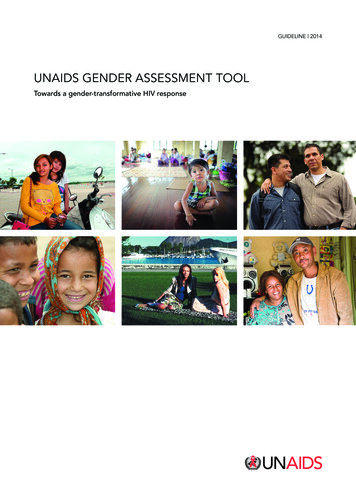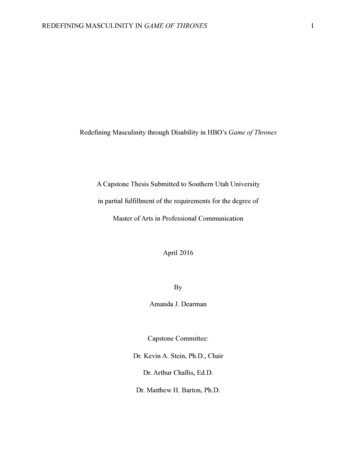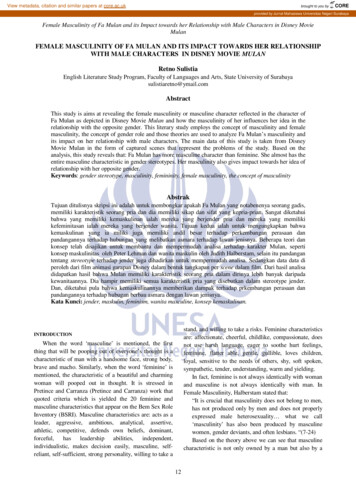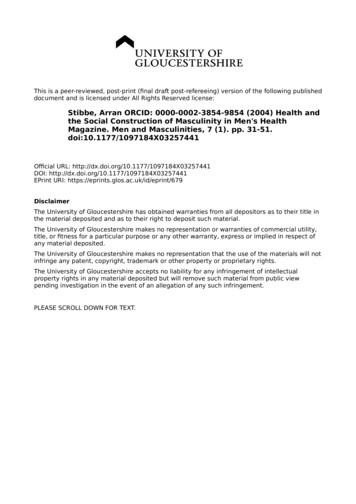
Transcription
International Journal of Business and Social ScienceVol. 11 No. 3 March 2020doi:10.30845/ijbss.v11n3p6Masculinity and Health – How Gender Shapes Male Attitudes towards HealthTerri JuneauTexas Woman‟s UniversityUnited StatesIntroductionWhen I get a cold, I typically go to a doctor if it gets too bad. If my husband gets a cold, he simply downplays it andremains sick for about three weeks as the cold turns into the flu. When that happens, he will simply say “I‟ll drink a lotof orange juice and be fine” and the flu turns into pneumonia and I drag him, unwillingly, to urgent care. What happensthough when there isn‟t a me to drag a man kicking and screaming to the doctor?Nothing. This is the norm now for males across the globe, of various ages, from all walks of life and varyingbackgrounds and ethnicities and race. Males are simply not going to the doctor. They aren‟t seeking help for physicalailments; they are not getting screened for male-only diseases and they are most certainly not reaching out for mentalhealth and illnesses. This is not just a societal problem; this is an epidemic of mass proportions. A big reason for thismass boycott of health provision is the way men view disease and how that links up with their own ideas ofmasculinity. It is not masculine to be weak or to ask for help. As a society we have reinforced what it is to be masculineby creating gender norms and roles. That has ledto fragile masculinity, or hegemonic masculinity, which is anovercompensation of masculinity which leads to destructive health behaviors and devastating outcomes to problemsthat could potentially be solved with a simple doctor visit.MethodologyThis research paper was done using a systematic review of literature found through the TWUniversal library system.Using the search term “constructions of masculinity” and “health” I got this many results. I then expanded beyond thelibrary results to get this many results. I then applied the following filters: Peer-reviewed, Full-text only and got thismany results. I also used the search term “masculinity and health” on the same website for a new search. I received117,290 results. I then expanded beyond the library collection to get 140,593 results. I then applied the followingfilters: Peer-reviewed, full-text and this time I set a date range of 2010 to present. This left me with 55,972 results. Idecided to not exclude studies and research done from outside the United States, as I think male health is somethingthat is a global issue. I then decided to include some studies that are older as I found that the findings were still relevanttoday.DiscussionAbout 75% of the research geared towards males and health looks towards mental health, not physical health (Affleck,Carmichael, and Whitley 2018; Apesoa-Varano, Barker, and Hinton 2018; Gast and Peak 2011; Hoy 2012; Kimmeland Mahler 2003; Kumpula and Ekstrand 2014; Mahalik et al. 2005; Möller-Leimkühler 2002). This could be due to ashift in men‟s studies programs, as the research states that males are becoming far more likely to suffer from a mentalbreakdown or illness such as substance abuse, manic rage episodes and depression; they also have the highest rate forsuicide (Affleck, Carmichael, and Whitley 2018). Physical health, while not as focused on, was also represented in theliterature when seeking out male health (Addis and Mahalik 2003; Annandale and Hunt 1990; Courtenay 2011; Galdas,Cheater, and Marshall 2005; Mansfield, Addis, and Mahalik 2003; Sloan, Conner, and Gough 2015; Tannenbaum andFrank 2011), though not as plentiful nor recent. Males are underreported in both mental and physical health eventhough they are far more likely to suffer a chronic illness and typically die 7 years before women (Courtenay 2000).When addressing why this is the case, the answer to both sides of mens‟ health was the same: Men aren‟t seeking helpbecause that is not what they are taught to do (Addis and Mahalik 2003; Courtenay 2000). All of the things one mustpossess to seek help either on a mental or on a physical level are feminine traits, not masculine ones. If we think aboutwhat must occur in order to get help, actions such as disclosure of illness, depending on others, and vulnerability are allcompeting with what males are taught from early on. They are taught that they must be strong, self-reliable and manlyand are societally awarded for not reporting illnesses and not appearing as weak (Annandale and Hunt 1990). Whenlooking at mental illness especially, men are reporting that their depression is linked to fragile masculinity (ApesoaVarano, Barker, and Hinton 2018) and that losing a job, getting an illness or going through a divorce made them feellike they lost their status as a man. The literature as a whole only highlights the role of hegemonic masculinity whenlooking at mental health such as depression and suicide.43
ISSN 2219-1933 (Print), 2219-6021 (Online) Center for PromotingIdeas, USAwww.ijbssnet.comMales are far more likely to develop risky behaviors like smoking and alcohol abuse due to how society hasconstructed its idea of what it means to be “masculine” (Courtenay 2000). If you really want to “be a man” you putyourself at great risk of disease, injury or death due to masculine ideals of hegemonic masculinity (Courtenay 2011).Things such as physical fighting, not being able to control anger and avoiding health screenings are all risky behaviorthat are deemed “traditionally masculine” by most cultures (Gast and Peak 2011).This overcompensation to appear “manly” also leads to detrimental actions like school shootings (Kimmel and Mahler2003), as the adolescent males involved typically are bullied and feel feminized. Males perceive this as a loss of power(Kumpula and Ekstrand 2014) and in return overcompensate. Highly masculine men hide emotions they should befeeling, so health questionnaires that are typically self-reported lack reliability (Moynihan 1998). This is not just anAmerican issue; a study was done that looked at six focus groups of boys aged 13 to 17 in Indonesia and in that studysmoking was equated with masculinity (Ng, Weinehall, and Öhman 2006). A quantitative study from the UnitedKingdom found that males with high masculinity traits scored higher on negative health behaviors (Sloan, Conner, andGough 2015). Mexican males are culturally taught to use machismo when looking at health behaviors (Sobralske 2006)and do not seek help.These behaviors are not relegated to an age within the male gender. When looking at older males, they will only seekhelp if it conflicts with hegemonic attitudes like dependence (Tannenbaum and Frank 2011) and suicide is typicallyhigher among older males (Apesoa-Varano, Barker, and Hinton 2018). Younger males are underreported when lookingat sexual health resources and have a tougher time communicating when it comes to sexual problems; they usemasculine scripts in which they have all the power when it comes to sex (Knight et al. 2012) therefore creating “lockerroom talk.” This also is not just a straight male problem. Even among gay males hegemonic attitudes are prevalent andanti-effeminacy beliefs are the norm due to the hegemonic attitude that men are superior to women (Taywaditep 2002).“Bottoms” in gay culture are deemed more feminized in sexual acts. When looking at some of the most extremehegemonic behavior, males who are injured in combat were interviewed and the research shows that themes such asmaintenance of social capital, being able to remain in the field and the risk of not being rewarded for hegemonicmasculinity all played a part in their delayed health help (Cogan, Haines, and Devore 2019).ConclusionRegardless of age, ethnicity, sexual preference or background there is a trend in healthcare among men of delayed ormissing help seeking behavior (Galdas, Cheater, and Marshall 2005). Masculinity negatively impacts both mentalhealth and physical health of men (Hoy 2012). Males who conform to masculine beliefs have greater benefits thanmales who seek help due to society‟s construction of gender (Mahalik et al. 2005; Möller-Leimkühler 2002). Very fewof the studies gave remedies for the issue. The only clear cut remedy given was to defeminize the health care systembut no instructions to how that would be done were given (Affleck, Carmichael, and Whitley 2018). Further researchshould be done on how to fix male health instead of causes of male health, as the cause is clearly masculinity.ReferencesAddis, Michael E., and James R. Mahalik. 2003. "Men, Masculinity, and the Contexts of Help Seeking." AmericanPsychologist 58(1):5-14. doi: 10.1037/0003-066X.58.1.5.Affleck, William, Victoria Carmichael and Rob Whitley. 2018. "Men's Mental Health: Social Determinants andImplications for Services." Canadian Journal of Psychiatry. Revue Canadienne De Psychiatrie 29673270). doi: 10.1177/0706743718762388.Annandale, Ellen, and Kate Hunt. 1990. "Masculinity, Femininity and Sex: An Exploration of their RelativeContribution to Explaining Gender Differences in Health." Sociology of Health & Illness s/10.1111/1467-9566.ep10844865).doi: 10.1111/1467-9566.ep10844865.Apesoa-Varano, Ester C., Judith C. Barker and Ladson Hinton. 2018. "“If You were Like Me, You would Consider itToo”: Suicide, Older Men, and Masculinity." Society and Mental Health /10.1177/2156869317725890). doi: 10.1177/2156869317725890.Cogan, Alison M., Christine E. Haines and Maria D. Devore. 2019. "Intersections of US Military Culture, HegemonicMasculinity, and Health Care among Injured Male Service Members." Men and nay, Will H. 2000. "Constructions of Masculinity and their Influence on Men's Well-being: A Theory of Genderand Health." Social Science & Medicine 50(10):1385-140144
International Journal of Business and Social ScienceVol. 11 No. 3 March direct.com/science/article/pii/S0277953699003901). doi: 10.1016/S0277-9536(99)003901.Courtenay, Will H. 2011. Dying to be Men.Taylor and Francis.Galdas, Paul M., Francine Cheater and Paul Marshall. 2005. "Men and Health Help‐seeking Behaviour: LiteratureReview." Journal of Advanced Nursing abs/10.1111/j.1365-2648.2004.03331.x).doi: 10.1111/j.1365-2648.2004.03331.x.Gast, Julie, and Terry Peak. 2011. ""It used to be that if it Weren'T Broken and Bleeding Profusely, I would Never Goto the Doctor": Men, Masculinity, and Health." American Journal of Men's Health 0798142). doi: 10.1177/1557988310377926.Hoy, Sandra. 2012. "Beyond Men Behaving Badly: A Meta-Ethnography of Men's Perspectives on PsychologicalDistress and Help Seeking." International Journal of Men's Health 1282107757). doi: 10.3149/jmh.1103.202.Kimmel, Michael S., and Matthew Mahler. 2003. "Adolescent Masculinity, Homophobia, and Violence." AmericanBehavioral Scientist full/10.1177/0002764203046010010). doi: 10.1177/0002764203046010010.Knight, Rod, Jean A. Shoveller, John L. Oliffe, Mark Gilbert, Blye Frank and Gina Ogilvie. 2012. "Masculinities, „guyTalk‟ and „manning Up‟: A Discourse Analysis of how Young Men Talk about Sexual Health." Sociology ofHealth & Illness 1/j.14679566.2012.01471.x.Kumpula, Esa, and Per Ekstrand. 2014. "Challenges and Possibilities for Understanding Men's Health in Twenty-FirstCentury Forensic Psychiatric Care." Issues in Mental Health Nursing 0.3109/01612840.2014.881441). doi: 10.3109/01612840.2014.881441.Kvigne, Kari, MaritKirkevold, Randi Martinsen and Berit A. Bronken. 2014. "Masculinity and Strokes: The ChallengesPresented to Younger Men by Chronic Illness." Journal of Gender Studies 0.1080/09589236.2013.790797). doi: 10.1080/09589236.2013.790797.Mahalik, James R., W. T. Talmadge, Benjamin D. Locke, Ryan P. J. Scott and Aaron B. Rochlen. 2005. "Using theConformity to Masculine Norms Inventory to Work with Men in a Clinical Setting." Journal of ClinicalPsychology abs/10.1002/jclp.20101). doi: 10.1002/jclp.20101.Mansfield, Abigail K., Michael E. Addis and James R. Mahalik. 2003. ""Why Won'T He Go to the Doctor?": ThePsychology of Men's Help Seeking." International Journal of Men's Health 2853737). doi: 10.3149/jmh.0202.93.Möller-Leimkühler, Anne M. 2002. "Barriers to Help-Seeking by Men: A Review of Sociocultural and ClinicalLiterature with Particular Reference to Depression." Journal of Affective Disorders 71(1):1-9.Moynihan, Clare. 1998. "Theories of Masculinity." Bmj 165.1072). doi: 10.1136/bmj.317.7165.1072.Ng, Nawi, L. Weinehall and A. Öhman. 2007. "'If I Don't Smoke, I'M Not a Real Man'-Indonesian Teenage Boys'Views about Smoking." Health Education Research 16987943). doi: 10.1093/her/cyl104.Sloan, Claire, Mark Conner and Brendan Gough. 2015. "How does Masculinity Impact on Health? A QuantitativeStudy of Masculinity and Health Behavior in a Sample of UK Men and Women." Psychology of Men &Masculinity 16(2):206-217 (https://search.proquest.com/docview/1546223228). doi: 10.1037/a0037261.Sobralske, Mary. 2006. "Machismo Sustains Health and Illness Beliefs of Mexican American Men." Journal of theAmerican Academy of Nurse Practitioners 18(8):348-350 .doi: 10.1111/j.1745-7599.2006.00144.x.Tannenbaum, Cara, and Blye Frank. 2011. "Masculinity and Health in Late Life Men." American Journal of Men'sHealth 5(3):243-254 7988310384609).doi: 10.1177/1557988310384609.Taywaditep, Kittiwut J. 2002. "Marginalization among the Marginalized." Journal of Homosexuality 300/J082v42n01 01). doi: 10.1300/J082v42n01 01.45
ISSN 2219-1933 (Print), 2219-6021 (Online)46 Center for PromotingIdeas, USAwww.ijbssnet.com
International Journal of Business and Social ScienceVol. 11 No. 3 March 2020doi:10.30845/ijbss.v11n3p647
ISSN 2219-1933 (Print), 2219-6021 (Online)48 Center for PromotingIdeas, USAwww.ijbssnet.com
International Journal of Business and Social ScienceVol. 11 No. 3 March 2020doi:10.30845/ijbss.v11n3p649
About 75% of the research geared towards males and health looks towards mental health, not physical health (Affleck, Carmichael, and Whitley 2018; Apesoa-Varano, Barker, and Hinton 2018; Gast and Peak 2011; Hoy 2012; Kimmel











